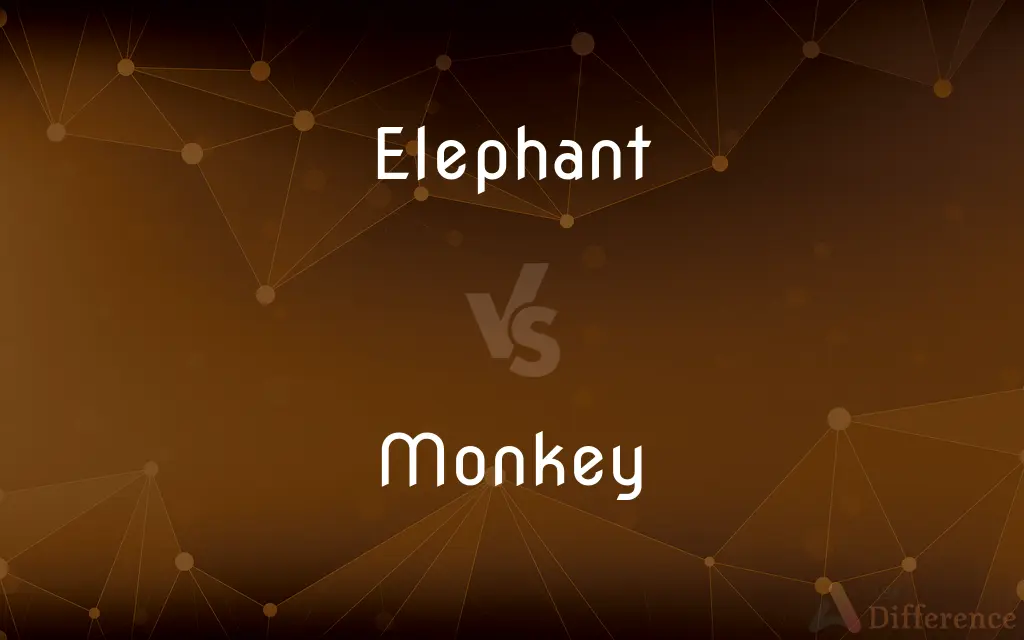Elephant vs. Monkey — What's the Difference?
Edited by Tayyaba Rehman — By Urooj Arif — Updated on April 14, 2024
Elephants are large, heavy mammals known for their intelligence and long trunks, while monkeys are smaller, agile primates known for their dexterity and social behavior.

Difference Between Elephant and Monkey
Table of Contents
ADVERTISEMENT
Key Differences
Elephants, recognized by their massive size and distinctive trunks, are herbivores and consume large quantities of vegetation daily. Whereas monkeys, much smaller and more varied in species, often have omnivorous diets that can include fruits, insects, and small animals.
Elephants are found in a variety of habitats including savannahs, forests, and marshes, primarily in Africa and Asia. On the other hand, monkeys thrive in diverse environments ranging from rainforests to mountainous areas across the globe, with species native to both Old World and New World regions.
While elephants are celebrated for their complex social structures and deep familial bonds, monkeys are noted for their high intelligence and complex social interactions, often forming large groups.
Elephants use their trunks for a variety of tasks such as eating, drinking, and social interactions; monkeys use their tails (in species that have them) for balance and sometimes as tools.
Elephants have longer lifespans, often living up to 60-70 years, while monkeys generally have shorter lifespans, varying widely among species but typically less than elephants.
ADVERTISEMENT
Comparison Chart
Size and Weight
Very large; up to 6,000 kg.
Smaller; 0.1 kg to 40 kg.
Habitat
Savannahs, forests, marshes.
Rainforests, mountains, plains.
Diet
Herbivorous.
Mostly omnivorous.
Social Structure
Complex, matriarchal groups.
Varied, often large groups.
Lifespan
60-70 years.
Generally shorter, varies widely.
Compare with Definitions
Elephant
Large mammals known for their massive bodies and long trunks.
An elephant uses its trunk to help feed itself.
Monkey
Social animals that thrive in groups.
A troop of monkeys was observed grooming each other.
Elephant
Known for their long lifespans in the wild.
Some elephants live as long as some humans, around 70 years.
Monkey
Primates known for their agility and dexterity.
The monkey swiftly moved through the treetops.
Elephant
Exhibits complex social behaviors and intelligence.
The elephant herd displayed mourning behavior for a lost calf.
Monkey
Have a range of sizes and features, including tails.
The capuchin is a small monkey with a notable intelligence level.
Elephant
Found primarily in Africa and Asia.
The African elephant is larger than its Asian counterpart.
Monkey
Diets vary widely but often include fruit and insects.
Monkeys at the zoo are fed a variety of fruits and vegetables.
Elephant
Herbivores that require vast amounts of food.
The elephant was seen grazing in the savannah.
Monkey
Found in both Old World and New World regions.
New World monkeys are notable for their prehensile tails.
Elephant
Elephants are a select group of proboscideans belonging to the family Elephantidae. They are the largest existing land animals.
Monkey
Monkey is a common name that may refer to certain groups or species of simian mammals of infraorder Simiiformes. The term is applied descriptively to groups of primates, such as families of New World monkeys and Old World monkeys.
Elephant
Any of several very large herbivorous mammals of the family Elephantidae native to Africa, South Asia, and Southeast Asia, having thick, almost hairless skin, a long, flexible, prehensile trunk, upper incisors forming long curved tusks of ivory, and, in the African species, large fan-shaped ears.
Monkey
Any of various tailed primates of the suborder Anthropoidea, including the macaques, baboons, capuchins, and marmosets, and excluding the apes.
Elephant
Any of various extinct animals of the family Elephantidae.
Monkey
A nonhuman ape. Not in scientific use.
Elephant
A mammal of the order Proboscidea, having a trunk, and two large ivory tusks jutting from the upper jaw.
Monkey
One who behaves in a way suggestive of a monkey, as a mischievous child or a mimic.
Elephant
(in particular) Any member of the subfamily Elephantinae not also of the genera Mammuthus and Primelephas.
Monkey
The iron block of a pile driver.
Elephant
(figuratively) Anything huge and ponderous.
Monkey
(Slang) A person who is mocked, duped, or made to appear a fool
They made a monkey out of him.
Elephant
Synonym of elephant paper
Monkey
Offensive Slang Used as a disparaging term for a person with dark skin.
Elephant
Used when counting to add length, so that each count takes about one second
Let's play hide and seek. I'll count. One elephant, two elephant, three elephant...
Monkey
To play, fiddle, trifle, or tamper with something
Who was monkeying with my phone?.
Elephant
Ivory.
Monkey
To behave in a mischievous or apish manner
Stop monkeying around!.
Elephant
(xiangqi) A xiangqi piece, that is moved two points diagonally, may not jump over intervening pieces and may not cross the river.
Monkey
To imitate or mimic; ape.
Elephant
A mammal of the order Proboscidia and family Elephantidae, of which two living species, Elephas maximus (formerly Elephas Indicus) and Loxodonta Africana (formerly E. Africanus), and several fossil species, are known. They have five toes, a long proboscis or trunk, and two large ivory tusks proceeding from the extremity of the upper jaw, and curving upwards. The molar teeth are large and have transverse folds. Elephants are the largest land animals now existing. The elephant is classed as a pachyderm.
Monkey
(properly) A member of the clade Simiiformes other than those in the clade Hominoidea containing humans and apes, generally (but not universally) distinguished by small size, tails, and cheek pouches.
He had been visiting an area zoo when a monkey swung from its tree perch, swiped his glasses and hurled them into a hippo hole.
Elephant
Ivory; the tusk of the elephant.
Monkey
A human considered to resemble monkeys in some way, including:
Elephant
Five-toed pachyderm
Monkey
A naughty or mischievous person, especially a child.
Stop misbehaving, you cheeky little monkey!
Elephant
The symbol of the Republican Party; introduced in cartoons by Thomas Nast in 1874
Monkey
(slang) The person in the motorcycle sidecar in sidecar racing.
Monkey
(pejorative) idiot: a person of minimal intelligence.
Monkey
(pejorative) uggo: an unattractive person, especially one whose face supposedly resembles a monkey's.
Monkey
Synonym of puppet: a person dancing to another's tune, a person controlled or directed by another.
No, no, no, not you. I want to talk to the organ grinder, not the monkey.
Monkey
A menial employee who does a repetitive job supposedly requiring minimal intelligence.
Code monkey... grease monkey... phone monkey... powder monkey...
Monkey
A black, a black person.
Monkey
(historical) A small trading vessel of the sixteenth century.
Monkey
The vessel in which a mess receives its full allowance of grog.
Monkey
The weight of a pile driver or drop hammer.
Monkey
A fluid consisting of hydrochloric acid and zinc, used in the process of soldering.
Monkey
(slang) five hundred, especially (British) 500 pounds sterling or 500 dollars.
Monkey
(blackjack) face card.
Monkey
(slang) A person's temper, said to be "up" when they are angry.
Monkey
(slang) A drug habit; an addiction; a compulsion.
Everybody's got something to hide except for me and my monkey.
Monkey
(dance) A dance popularized by Major Lance in 1963, now usually only its upper-body dance move involving exaggerated drumming motions.
Monkey
To meddle; to mess (with).
Please don't monkey with the controls if you don't know what you're doing.
Monkey
(transitive) To mimic; to ape.
Monkey
In the most general sense, any one of the Quadrumana, including apes, baboons, and lemurs.
Monkey
A term of disapproval, ridicule, or contempt, as for a mischievous child.
This is the monkey's own giving out; she is persuaded I will marry her.
Monkey
The weight or hammer of a pile driver, that is, a very heavy mass of iron, which, being raised on high, falls on the head of the pile, and drives it into the earth; the falling weight of a drop hammer used in forging.
Monkey
A small trading vessel of the sixteenth century.
Monkey
To act or treat as a monkey does; to ape; to act in a grotesque or meddlesome manner.
Monkey
Any of various long-tailed primates (excluding the prosimians)
Monkey
One who is playfully mischievous
Monkey
Play around with or alter or falsify, usually secretively or dishonestly;
Someone tampered with the documents on my desk
The reporter fiddle with the facts
Monkey
Do random, unplanned work or activities or spend time idly;
The old lady is usually mucking about in her little house
Common Curiosities
What are the conservation statuses of elephants and monkeys?
Many species of both elephants and monkeys are threatened due to habitat loss and poaching.
What primarily distinguishes elephants from monkeys in terms of habitat?
Elephants are typically found in savannahs and forests, while monkeys are more diverse, inhabiting various environments including rainforests and mountains.
Can both elephants and monkeys use tools?
Yes, both are known to use tools; elephants use sticks to scratch themselves, while some monkeys use stones to crack nuts.
How do the diets of elephants and monkeys differ?
Elephants are herbivores, focusing on vegetation, while monkeys are usually omnivorous, with diets that can include insects and even small animals.
How do the social structures of elephants and monkeys compare?
Elephants have a matriarchal structure, whereas monkeys can have various social systems, often forming large, complex groups.
Are there any cultural significances associated with elephants or monkeys?
Both are culturally significant; elephants are often seen as symbols of wisdom and memory in various cultures, while monkeys are viewed as symbols of trickery and playfulness.
How does the intelligence of elephants compare to that of monkeys?
Both are considered highly intelligent; elephants are known for their memory and problem-solving skills, and monkeys for their problem-solving and social strategies.
Why do elephants have such long lifespans?
Their long lifespans are attributed to their slow metabolism and the evolutionary advantage of a longer life for raising and teaching young.
What role does the tail play in monkeys?
In many monkey species, especially in the New World, tails are used for balance and are sometimes prehensile, aiding in climbing.
What threats face elephants and monkeys today?
Both face significant threats from habitat destruction and illegal wildlife trade, impacting their populations worldwide.
Share Your Discovery

Previous Comparison
Rarely vs. Sometimes
Next Comparison
Up vs. AboveAuthor Spotlight
Written by
Urooj ArifUrooj is a skilled content writer at Ask Difference, known for her exceptional ability to simplify complex topics into engaging and informative content. With a passion for research and a flair for clear, concise writing, she consistently delivers articles that resonate with our diverse audience.
Edited by
Tayyaba RehmanTayyaba Rehman is a distinguished writer, currently serving as a primary contributor to askdifference.com. As a researcher in semantics and etymology, Tayyaba's passion for the complexity of languages and their distinctions has found a perfect home on the platform. Tayyaba delves into the intricacies of language, distinguishing between commonly confused words and phrases, thereby providing clarity for readers worldwide.














































